Decision Making Theory in the Global Market: Tata Nano Report
VerifiedAdded on 2022/08/29
|6
|1377
|15
Report
AI Summary
This report examines Tata Motors' strategic decision to launch the Tata Nano, a low-cost car aimed at the Indian market. It delves into the inspiration behind the Nano, the innovative steps taken in its design, and the challenges faced, including political risks related to land acquisition. The report highlights the company's focus on understanding customer needs and affordability, as well as the ethical leadership displayed by the Tata Group. It also discusses the Nano's design considerations, such as engine size and fuel efficiency. The report concludes by emphasizing the initial disruptions caused by political issues and the Nano's contribution to the automotive industry by fulfilling the needs of a large segment of the population.
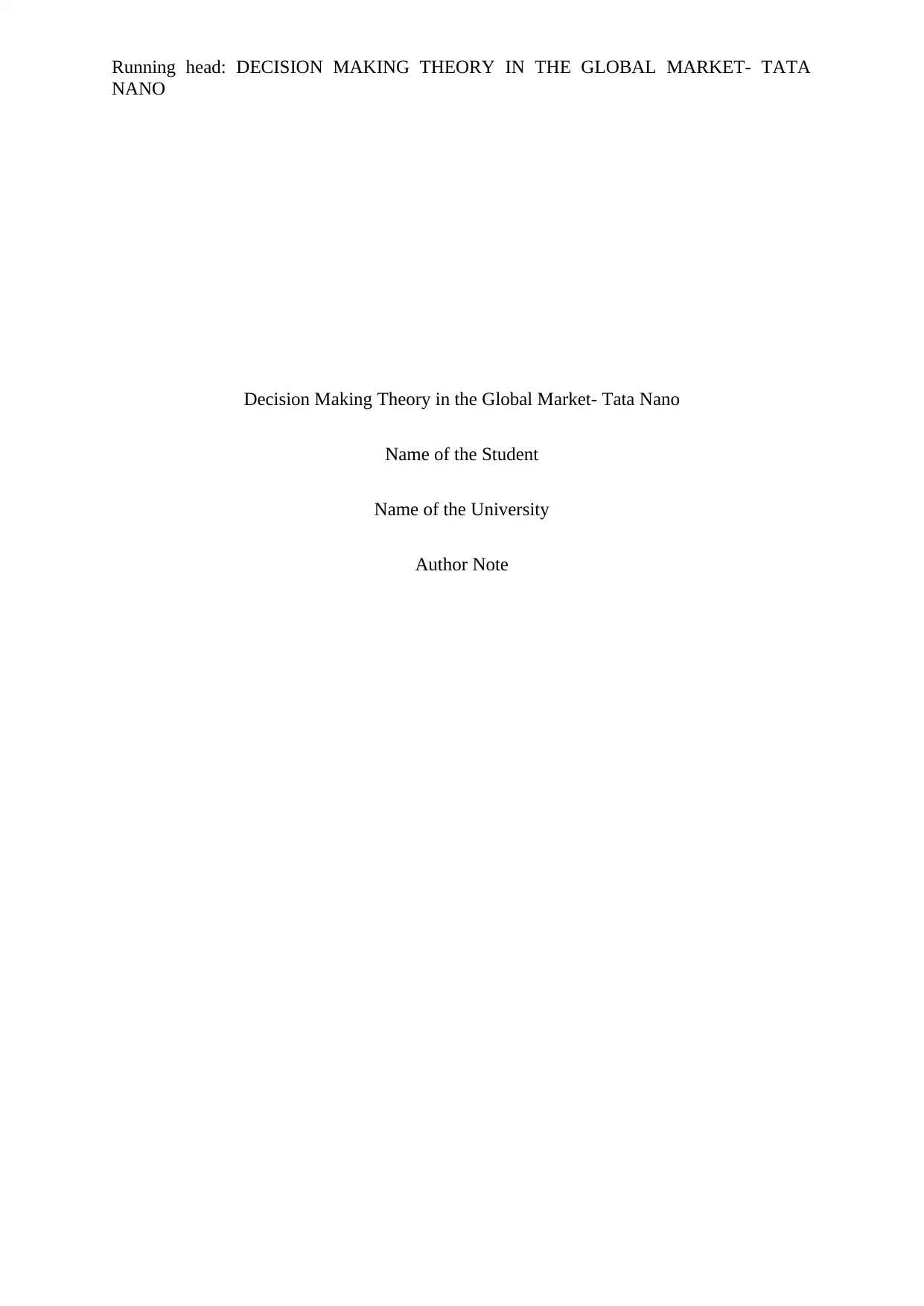
Running head: DECISION MAKING THEORY IN THE GLOBAL MARKET- TATA
NANO
Decision Making Theory in the Global Market- Tata Nano
Name of the Student
Name of the University
Author Note
NANO
Decision Making Theory in the Global Market- Tata Nano
Name of the Student
Name of the University
Author Note
Paraphrase This Document
Need a fresh take? Get an instant paraphrase of this document with our AI Paraphraser
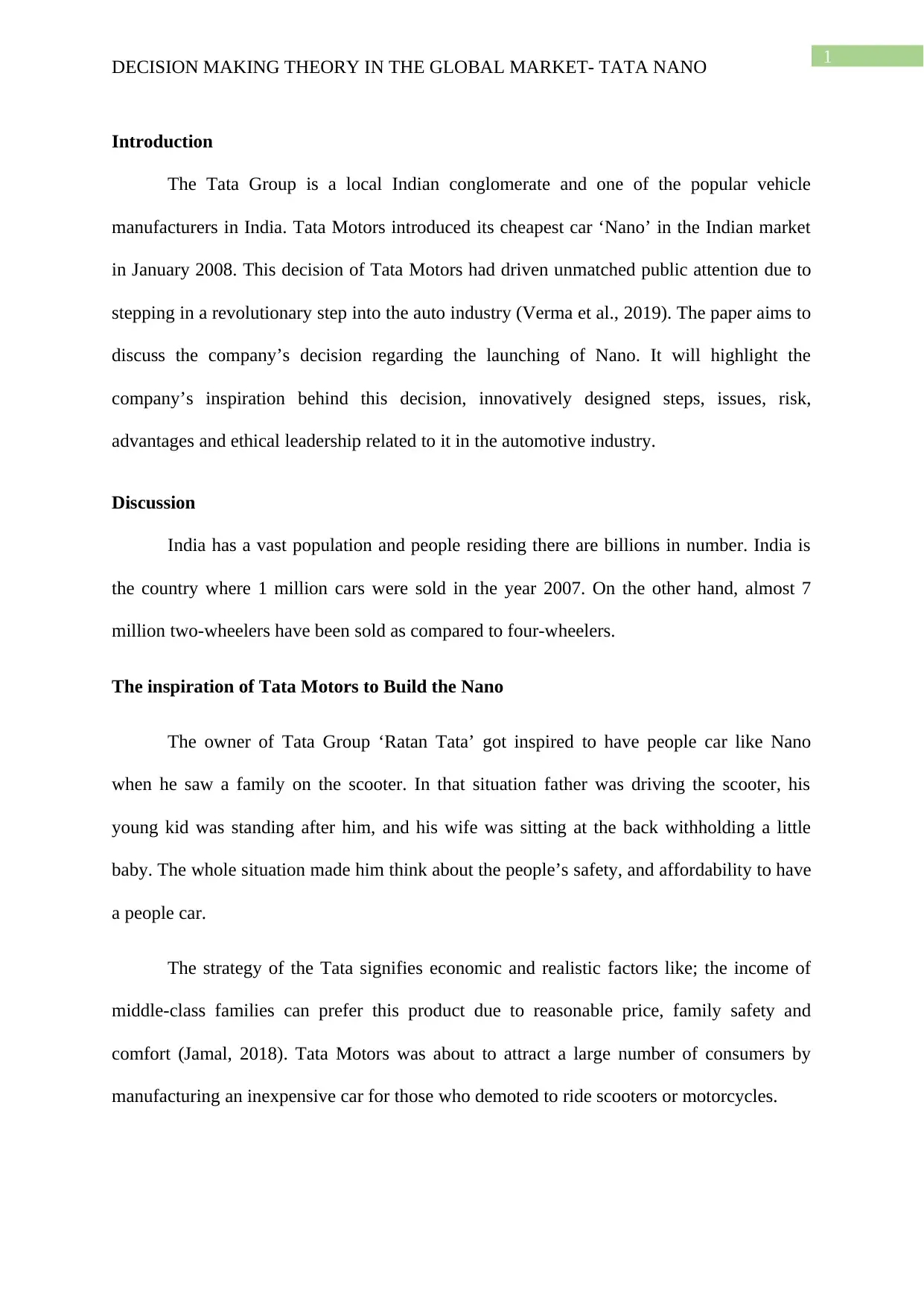
1
DECISION MAKING THEORY IN THE GLOBAL MARKET- TATA NANO
Introduction
The Tata Group is a local Indian conglomerate and one of the popular vehicle
manufacturers in India. Tata Motors introduced its cheapest car ‘Nano’ in the Indian market
in January 2008. This decision of Tata Motors had driven unmatched public attention due to
stepping in a revolutionary step into the auto industry (Verma et al., 2019). The paper aims to
discuss the company’s decision regarding the launching of Nano. It will highlight the
company’s inspiration behind this decision, innovatively designed steps, issues, risk,
advantages and ethical leadership related to it in the automotive industry.
Discussion
India has a vast population and people residing there are billions in number. India is
the country where 1 million cars were sold in the year 2007. On the other hand, almost 7
million two-wheelers have been sold as compared to four-wheelers.
The inspiration of Tata Motors to Build the Nano
The owner of Tata Group ‘Ratan Tata’ got inspired to have people car like Nano
when he saw a family on the scooter. In that situation father was driving the scooter, his
young kid was standing after him, and his wife was sitting at the back withholding a little
baby. The whole situation made him think about the people’s safety, and affordability to have
a people car.
The strategy of the Tata signifies economic and realistic factors like; the income of
middle-class families can prefer this product due to reasonable price, family safety and
comfort (Jamal, 2018). Tata Motors was about to attract a large number of consumers by
manufacturing an inexpensive car for those who demoted to ride scooters or motorcycles.
DECISION MAKING THEORY IN THE GLOBAL MARKET- TATA NANO
Introduction
The Tata Group is a local Indian conglomerate and one of the popular vehicle
manufacturers in India. Tata Motors introduced its cheapest car ‘Nano’ in the Indian market
in January 2008. This decision of Tata Motors had driven unmatched public attention due to
stepping in a revolutionary step into the auto industry (Verma et al., 2019). The paper aims to
discuss the company’s decision regarding the launching of Nano. It will highlight the
company’s inspiration behind this decision, innovatively designed steps, issues, risk,
advantages and ethical leadership related to it in the automotive industry.
Discussion
India has a vast population and people residing there are billions in number. India is
the country where 1 million cars were sold in the year 2007. On the other hand, almost 7
million two-wheelers have been sold as compared to four-wheelers.
The inspiration of Tata Motors to Build the Nano
The owner of Tata Group ‘Ratan Tata’ got inspired to have people car like Nano
when he saw a family on the scooter. In that situation father was driving the scooter, his
young kid was standing after him, and his wife was sitting at the back withholding a little
baby. The whole situation made him think about the people’s safety, and affordability to have
a people car.
The strategy of the Tata signifies economic and realistic factors like; the income of
middle-class families can prefer this product due to reasonable price, family safety and
comfort (Jamal, 2018). Tata Motors was about to attract a large number of consumers by
manufacturing an inexpensive car for those who demoted to ride scooters or motorcycles.
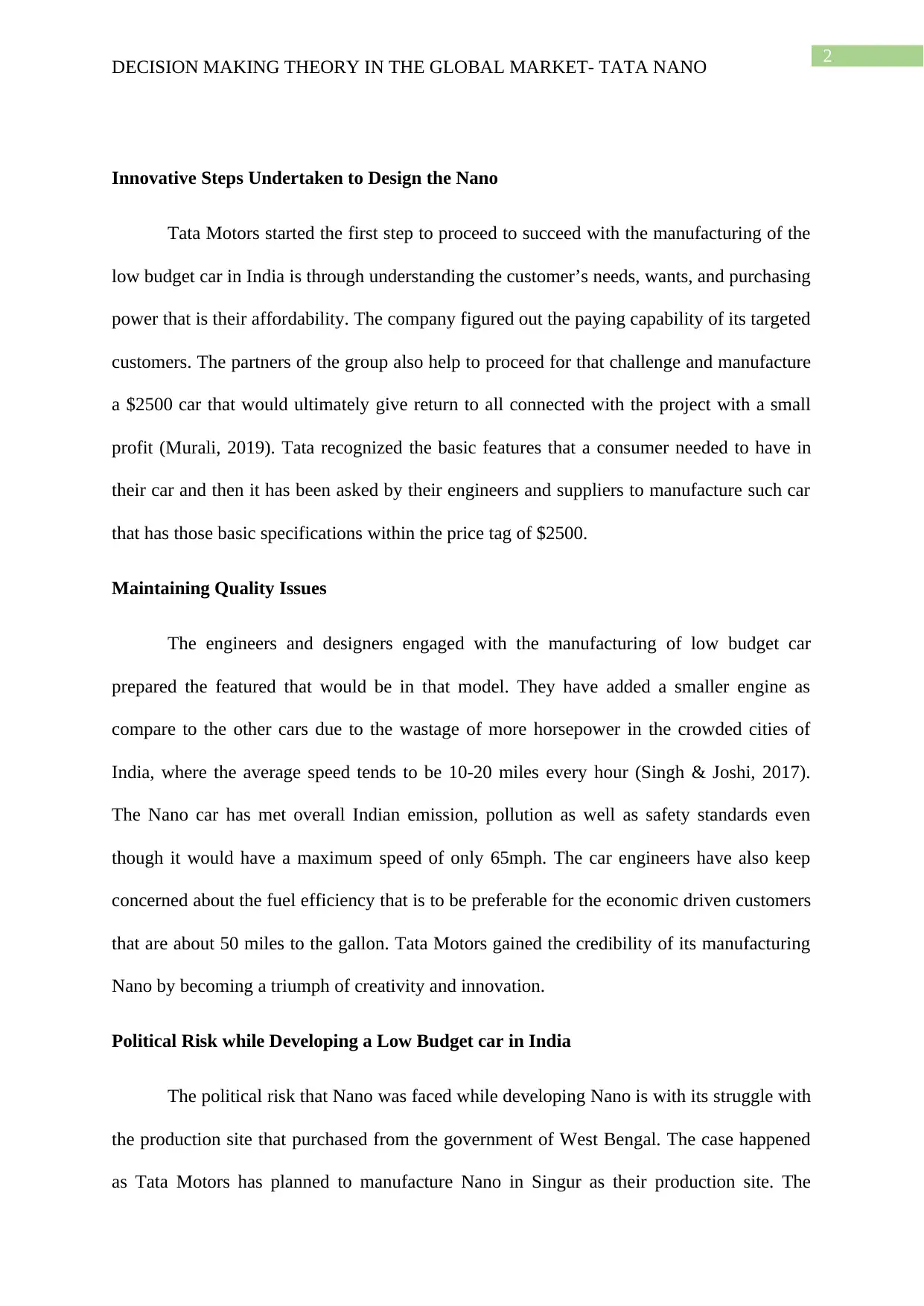
2
DECISION MAKING THEORY IN THE GLOBAL MARKET- TATA NANO
Innovative Steps Undertaken to Design the Nano
Tata Motors started the first step to proceed to succeed with the manufacturing of the
low budget car in India is through understanding the customer’s needs, wants, and purchasing
power that is their affordability. The company figured out the paying capability of its targeted
customers. The partners of the group also help to proceed for that challenge and manufacture
a $2500 car that would ultimately give return to all connected with the project with a small
profit (Murali, 2019). Tata recognized the basic features that a consumer needed to have in
their car and then it has been asked by their engineers and suppliers to manufacture such car
that has those basic specifications within the price tag of $2500.
Maintaining Quality Issues
The engineers and designers engaged with the manufacturing of low budget car
prepared the featured that would be in that model. They have added a smaller engine as
compare to the other cars due to the wastage of more horsepower in the crowded cities of
India, where the average speed tends to be 10-20 miles every hour (Singh & Joshi, 2017).
The Nano car has met overall Indian emission, pollution as well as safety standards even
though it would have a maximum speed of only 65mph. The car engineers have also keep
concerned about the fuel efficiency that is to be preferable for the economic driven customers
that are about 50 miles to the gallon. Tata Motors gained the credibility of its manufacturing
Nano by becoming a triumph of creativity and innovation.
Political Risk while Developing a Low Budget car in India
The political risk that Nano was faced while developing Nano is with its struggle with
the production site that purchased from the government of West Bengal. The case happened
as Tata Motors has planned to manufacture Nano in Singur as their production site. The
DECISION MAKING THEORY IN THE GLOBAL MARKET- TATA NANO
Innovative Steps Undertaken to Design the Nano
Tata Motors started the first step to proceed to succeed with the manufacturing of the
low budget car in India is through understanding the customer’s needs, wants, and purchasing
power that is their affordability. The company figured out the paying capability of its targeted
customers. The partners of the group also help to proceed for that challenge and manufacture
a $2500 car that would ultimately give return to all connected with the project with a small
profit (Murali, 2019). Tata recognized the basic features that a consumer needed to have in
their car and then it has been asked by their engineers and suppliers to manufacture such car
that has those basic specifications within the price tag of $2500.
Maintaining Quality Issues
The engineers and designers engaged with the manufacturing of low budget car
prepared the featured that would be in that model. They have added a smaller engine as
compare to the other cars due to the wastage of more horsepower in the crowded cities of
India, where the average speed tends to be 10-20 miles every hour (Singh & Joshi, 2017).
The Nano car has met overall Indian emission, pollution as well as safety standards even
though it would have a maximum speed of only 65mph. The car engineers have also keep
concerned about the fuel efficiency that is to be preferable for the economic driven customers
that are about 50 miles to the gallon. Tata Motors gained the credibility of its manufacturing
Nano by becoming a triumph of creativity and innovation.
Political Risk while Developing a Low Budget car in India
The political risk that Nano was faced while developing Nano is with its struggle with
the production site that purchased from the government of West Bengal. The case happened
as Tata Motors has planned to manufacture Nano in Singur as their production site. The
⊘ This is a preview!⊘
Do you want full access?
Subscribe today to unlock all pages.

Trusted by 1+ million students worldwide
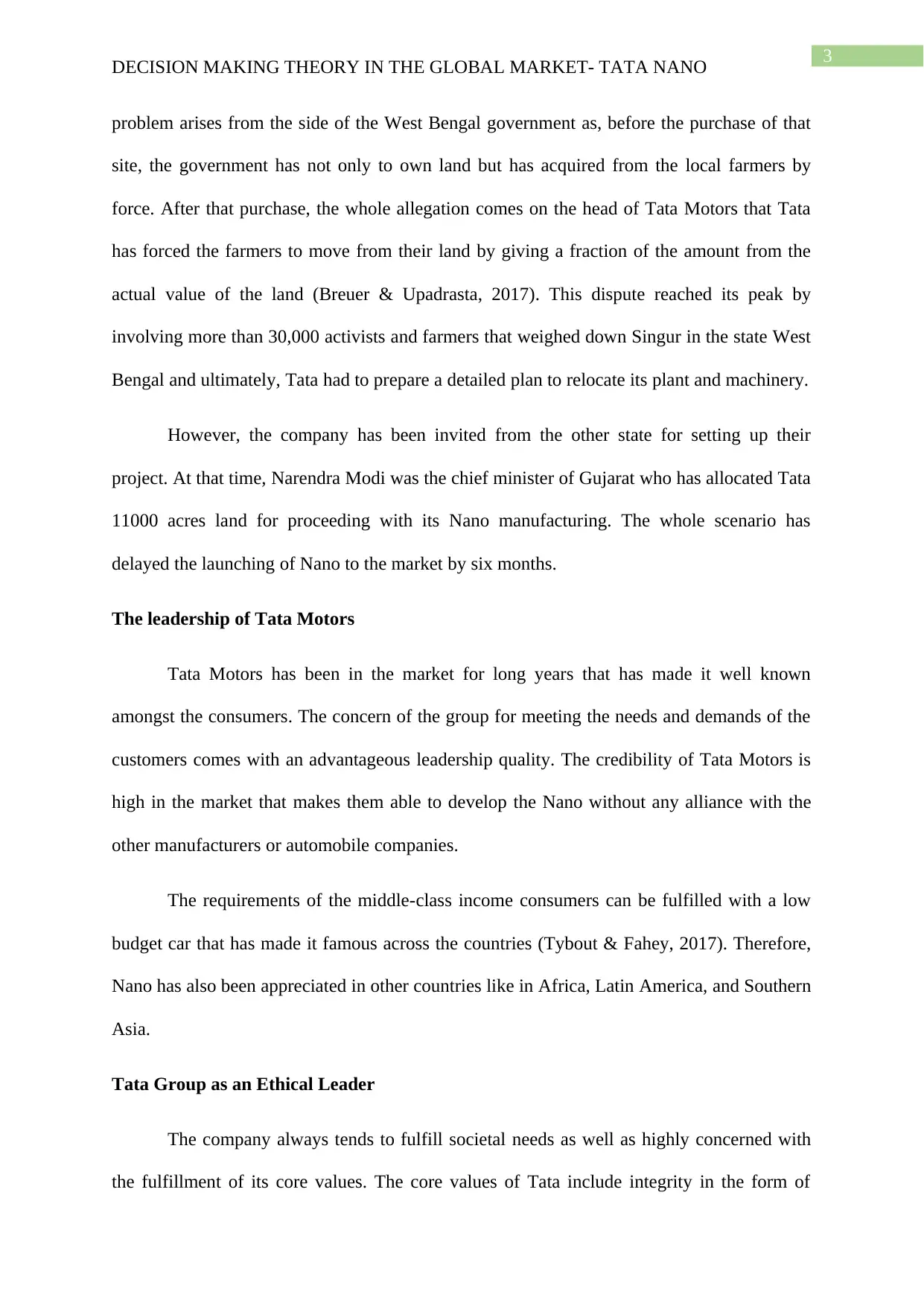
3
DECISION MAKING THEORY IN THE GLOBAL MARKET- TATA NANO
problem arises from the side of the West Bengal government as, before the purchase of that
site, the government has not only to own land but has acquired from the local farmers by
force. After that purchase, the whole allegation comes on the head of Tata Motors that Tata
has forced the farmers to move from their land by giving a fraction of the amount from the
actual value of the land (Breuer & Upadrasta, 2017). This dispute reached its peak by
involving more than 30,000 activists and farmers that weighed down Singur in the state West
Bengal and ultimately, Tata had to prepare a detailed plan to relocate its plant and machinery.
However, the company has been invited from the other state for setting up their
project. At that time, Narendra Modi was the chief minister of Gujarat who has allocated Tata
11000 acres land for proceeding with its Nano manufacturing. The whole scenario has
delayed the launching of Nano to the market by six months.
The leadership of Tata Motors
Tata Motors has been in the market for long years that has made it well known
amongst the consumers. The concern of the group for meeting the needs and demands of the
customers comes with an advantageous leadership quality. The credibility of Tata Motors is
high in the market that makes them able to develop the Nano without any alliance with the
other manufacturers or automobile companies.
The requirements of the middle-class income consumers can be fulfilled with a low
budget car that has made it famous across the countries (Tybout & Fahey, 2017). Therefore,
Nano has also been appreciated in other countries like in Africa, Latin America, and Southern
Asia.
Tata Group as an Ethical Leader
The company always tends to fulfill societal needs as well as highly concerned with
the fulfillment of its core values. The core values of Tata include integrity in the form of
DECISION MAKING THEORY IN THE GLOBAL MARKET- TATA NANO
problem arises from the side of the West Bengal government as, before the purchase of that
site, the government has not only to own land but has acquired from the local farmers by
force. After that purchase, the whole allegation comes on the head of Tata Motors that Tata
has forced the farmers to move from their land by giving a fraction of the amount from the
actual value of the land (Breuer & Upadrasta, 2017). This dispute reached its peak by
involving more than 30,000 activists and farmers that weighed down Singur in the state West
Bengal and ultimately, Tata had to prepare a detailed plan to relocate its plant and machinery.
However, the company has been invited from the other state for setting up their
project. At that time, Narendra Modi was the chief minister of Gujarat who has allocated Tata
11000 acres land for proceeding with its Nano manufacturing. The whole scenario has
delayed the launching of Nano to the market by six months.
The leadership of Tata Motors
Tata Motors has been in the market for long years that has made it well known
amongst the consumers. The concern of the group for meeting the needs and demands of the
customers comes with an advantageous leadership quality. The credibility of Tata Motors is
high in the market that makes them able to develop the Nano without any alliance with the
other manufacturers or automobile companies.
The requirements of the middle-class income consumers can be fulfilled with a low
budget car that has made it famous across the countries (Tybout & Fahey, 2017). Therefore,
Nano has also been appreciated in other countries like in Africa, Latin America, and Southern
Asia.
Tata Group as an Ethical Leader
The company always tends to fulfill societal needs as well as highly concerned with
the fulfillment of its core values. The core values of Tata include integrity in the form of
Paraphrase This Document
Need a fresh take? Get an instant paraphrase of this document with our AI Paraphraser
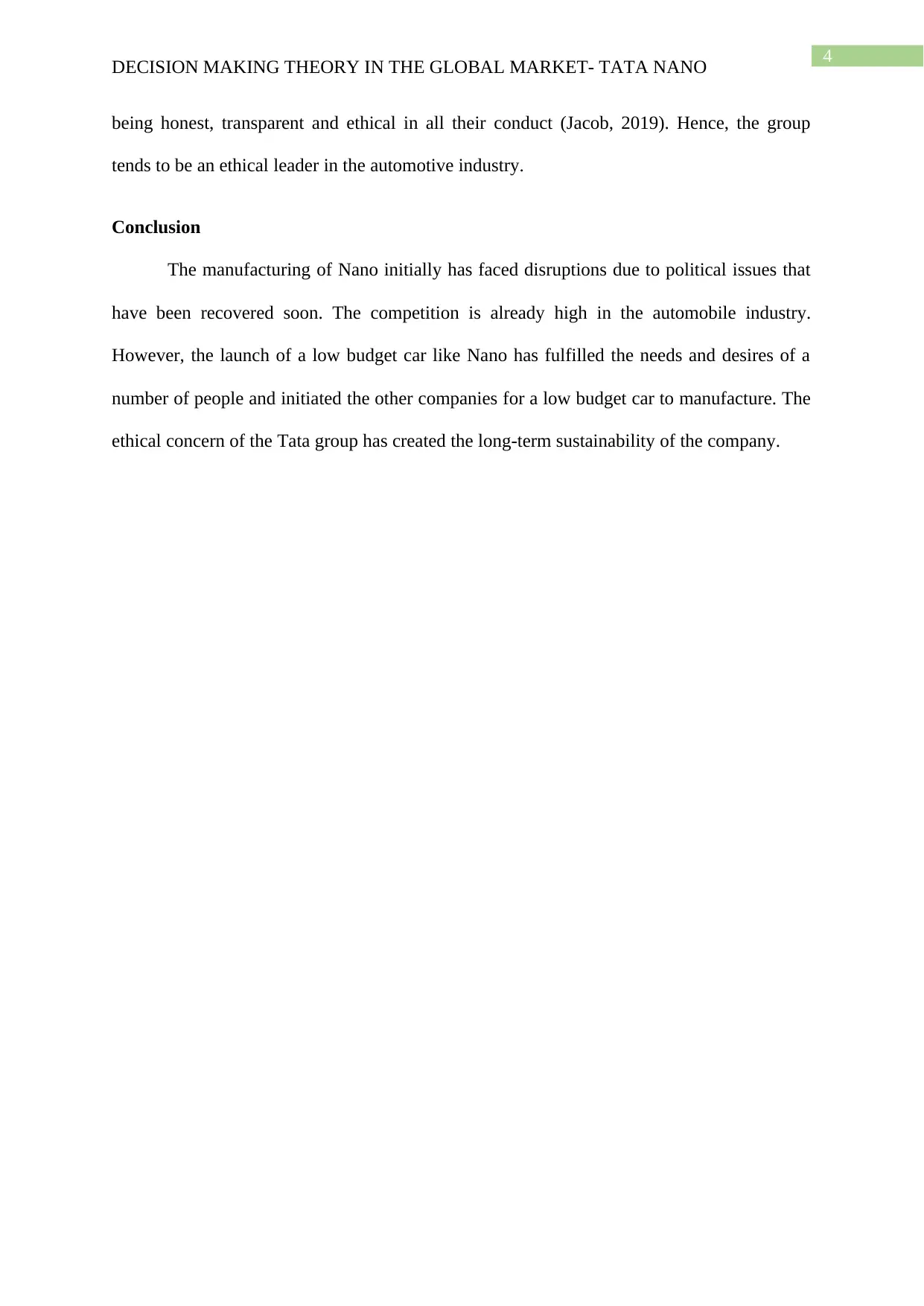
4
DECISION MAKING THEORY IN THE GLOBAL MARKET- TATA NANO
being honest, transparent and ethical in all their conduct (Jacob, 2019). Hence, the group
tends to be an ethical leader in the automotive industry.
Conclusion
The manufacturing of Nano initially has faced disruptions due to political issues that
have been recovered soon. The competition is already high in the automobile industry.
However, the launch of a low budget car like Nano has fulfilled the needs and desires of a
number of people and initiated the other companies for a low budget car to manufacture. The
ethical concern of the Tata group has created the long-term sustainability of the company.
DECISION MAKING THEORY IN THE GLOBAL MARKET- TATA NANO
being honest, transparent and ethical in all their conduct (Jacob, 2019). Hence, the group
tends to be an ethical leader in the automotive industry.
Conclusion
The manufacturing of Nano initially has faced disruptions due to political issues that
have been recovered soon. The competition is already high in the automobile industry.
However, the launch of a low budget car like Nano has fulfilled the needs and desires of a
number of people and initiated the other companies for a low budget car to manufacture. The
ethical concern of the Tata group has created the long-term sustainability of the company.
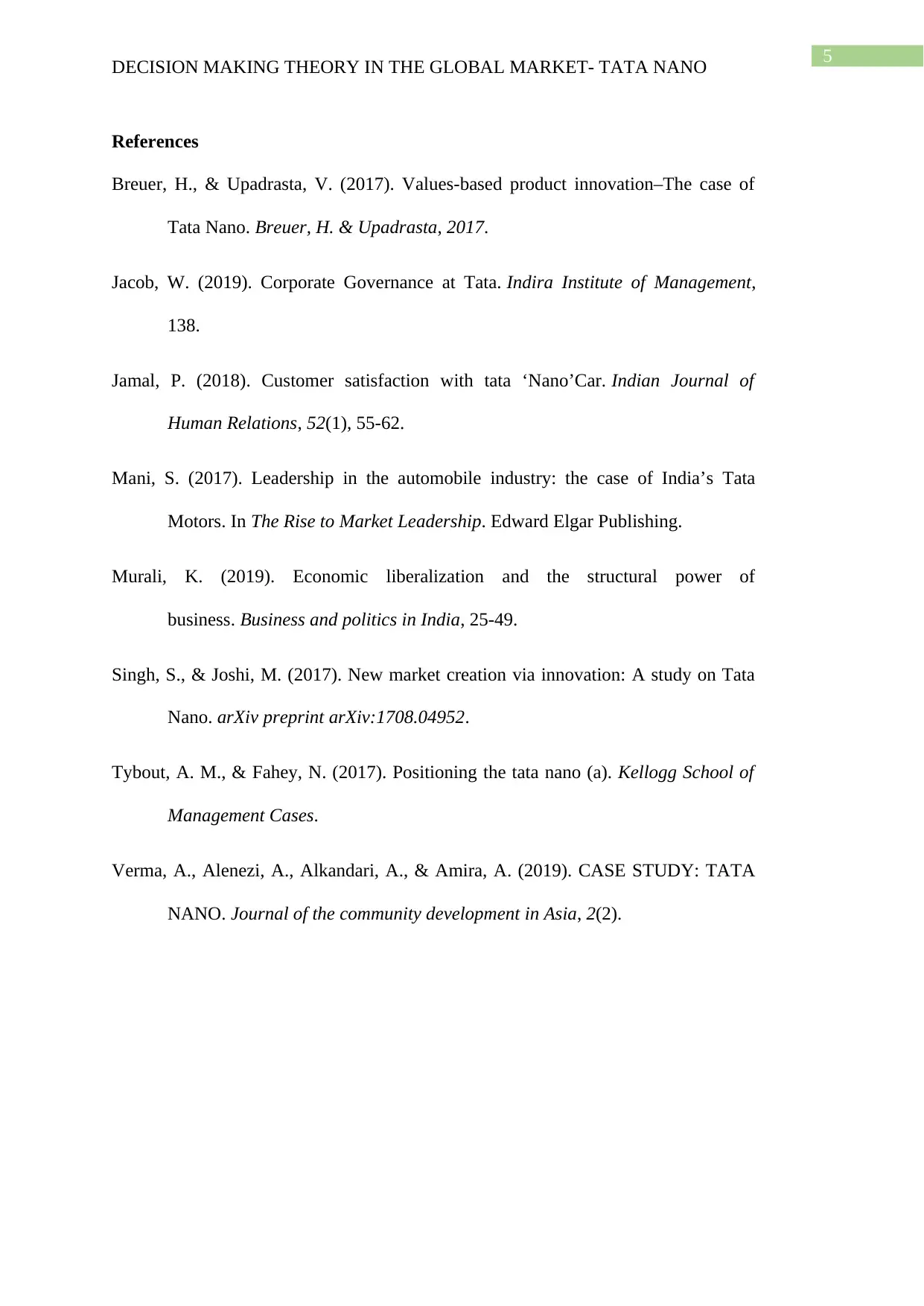
5
DECISION MAKING THEORY IN THE GLOBAL MARKET- TATA NANO
References
Breuer, H., & Upadrasta, V. (2017). Values-based product innovation–The case of
Tata Nano. Breuer, H. & Upadrasta, 2017.
Jacob, W. (2019). Corporate Governance at Tata. Indira Institute of Management,
138.
Jamal, P. (2018). Customer satisfaction with tata ‘Nano’Car. Indian Journal of
Human Relations, 52(1), 55-62.
Mani, S. (2017). Leadership in the automobile industry: the case of India’s Tata
Motors. In The Rise to Market Leadership. Edward Elgar Publishing.
Murali, K. (2019). Economic liberalization and the structural power of
business. Business and politics in India, 25-49.
Singh, S., & Joshi, M. (2017). New market creation via innovation: A study on Tata
Nano. arXiv preprint arXiv:1708.04952.
Tybout, A. M., & Fahey, N. (2017). Positioning the tata nano (a). Kellogg School of
Management Cases.
Verma, A., Alenezi, A., Alkandari, A., & Amira, A. (2019). CASE STUDY: TATA
NANO. Journal of the community development in Asia, 2(2).
DECISION MAKING THEORY IN THE GLOBAL MARKET- TATA NANO
References
Breuer, H., & Upadrasta, V. (2017). Values-based product innovation–The case of
Tata Nano. Breuer, H. & Upadrasta, 2017.
Jacob, W. (2019). Corporate Governance at Tata. Indira Institute of Management,
138.
Jamal, P. (2018). Customer satisfaction with tata ‘Nano’Car. Indian Journal of
Human Relations, 52(1), 55-62.
Mani, S. (2017). Leadership in the automobile industry: the case of India’s Tata
Motors. In The Rise to Market Leadership. Edward Elgar Publishing.
Murali, K. (2019). Economic liberalization and the structural power of
business. Business and politics in India, 25-49.
Singh, S., & Joshi, M. (2017). New market creation via innovation: A study on Tata
Nano. arXiv preprint arXiv:1708.04952.
Tybout, A. M., & Fahey, N. (2017). Positioning the tata nano (a). Kellogg School of
Management Cases.
Verma, A., Alenezi, A., Alkandari, A., & Amira, A. (2019). CASE STUDY: TATA
NANO. Journal of the community development in Asia, 2(2).
⊘ This is a preview!⊘
Do you want full access?
Subscribe today to unlock all pages.

Trusted by 1+ million students worldwide
1 out of 6
Related Documents
Your All-in-One AI-Powered Toolkit for Academic Success.
+13062052269
info@desklib.com
Available 24*7 on WhatsApp / Email
![[object Object]](/_next/static/media/star-bottom.7253800d.svg)
Unlock your academic potential
Copyright © 2020–2026 A2Z Services. All Rights Reserved. Developed and managed by ZUCOL.





